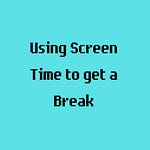I don’t know about you, but for me, nothing starts a power struggle faster than labeling someone’s behavior. If I tell my child or a student that their tone is rude, I am inviting a response of “no it’s not”. If I say “what you said isn’t appropriate,” I might hear “yes it is”.
As soon as a power struggle starts, connection stops. And if we’re trying to get our kids to notice how they are acting or how something like screens or technology impact them, a power struggle is going to make that harder.
Enter the magic word I use all the time: notice.
The word “notice” is a workhorse in my house. I haven’t shared much about this before, but I dive deep into how I use this word and how it applies to screen time (and many other things) in my book, which you can pre-order here!
Noticing is neutral. It doesn’t ascribe morality, intent, or shame. Noticing keeps the focus on objective information, instead of subjective opinion.
If we notice what is objectively true or observable, we keep our interaction with kids focused on the facts, without attributing those facts to a child’s intent or personality.
We can- and should- discuss the impact of that behavior, the consequences, or our concerns, but by starting with what we notice we can start the conversation more neutrally.
“You aren’t listening” becomes “I told you to turn off the TV and you did not.”
“You’re being rude” becomes “You told your sister to shut up.”
“You weren’t honest with me” becomes “I asked if you had homework and you said no, but you did have homework.”












Share this post